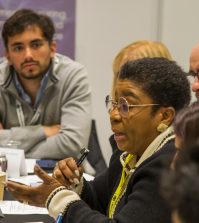Baltic states tackle gender bias in AI, the world’s most gender-equal country, and more

Welcome to the latest edition of the Global Government Women’s Network newsletter.
This month, we hear from Elise Legendre, chief data officer at Agriculture and Agri-Food Canada, who told GGF: “We are at a turning point right now, on the cusp of a profound transformation with all the promises of data-driven technologies such as artificial intelligence. Now more than ever, we need a strong civil service to ensure that all the people benefit from this transformation, and no one gets left behind.”
We also look at the World Economic Forum’s latest Global Gender Gap report, an award-winning policy to prevent digital sex crimes in South Korea, and more.
In this edition:
- Five minutes with Elise Legendre, chief data officer at Agriculture and Agri-Food Canada
- Estonia and Lithuania tackle gender bias in AI
- The world’s most gender-equal country
- Training: Women into leadership
- UN public service awards recognise gender equality projects
- Flexible working boosts gender balance in Australia’s public service
- Webinar: Hybrid working and women civil servants
Five minutes with Elise Legendre, chief data officer at Agriculture and Agri-Food Canada

In this interview, Elise Legendre, chief data officer at Agriculture and Agri-Food Canada, tells GGF what attracted her to her role, the best piece of career advice she has received, and why diverse representation matters more than ever in the civil service.
Family-friendly benefits: On what drew her to a career in the civil service, Legendre said: “Honestly, it was paid sick days”, after she battled through a work project whilst she and her young son were ill in a previous role. Two decades later, Legendre said she appreciates that as well as “great benefits for a young family, the civil service also allowed me to contribute to the greater good, levelling the playing field so that every member of society can fulfil their potential”.
All the voices at the table: On gender balance in the civil service, Legendre said: “The implication of not having women and other equity-seeking groups represented in decision-making roles is that the decisions made may not take into consideration their perspectives as fully as they could and as such, may not be leading to programmes and services that truly meet the needs of those populations.”
“Representation matters and the public service needs to represent the people it serves,” she said.
Policy matters: On the most important policy areas affecting women and girls, Legendre highlighted the need to do more to end gender-based violence.
“In my view, it starts with early childhood education, access to quality healthcare and empathy/conflict resolution training in schools,” she said. “It also requires more investment in social services to help with frontline response.”
GenAI: Agriculture and Agri-Food Canada was the first department in Canada to release a public-facing tool that uses generative AI – AgPal Chat. Legendre said she is proud of the project, which was the winner of the first Public Service Data Challenge, and that it shows how “the civil service can be innovative, that there is a lot of talent within our ranks and that, by working collaboratively, we can deliver positive results in a timely manner”.
Read the full interview with Elise here, and read more too about how the Data Challenge serves as an engine of innovation for Canada’s public services.
Estonia and Lithuania tackle gender bias in AI

The governments of Estonia and Lithuania are launching a project focused on equality and the use of AI.
EquiTech: The 24-month EquiTech project aims to ensure that “automated decision-making systems” and “state services based on artificial intelligence” do not discriminate based on gender or against vulnerable groups, and that fundamental rights are protected.
Multidisciplinary team: “Our desire is to better understand the mechanisms by which algorithms can lead to discriminatory outcomes and how to avoid it,” said Christian Veske, Estonia’s commissioner for equality. The project brings together Estonia’s Office of the Commissioner for Gender Equality and Equal Treatment, the Ministry of Justice, and the Ministry of Economic Affairs and Communications, Tallinn University of Technology and the Office of the Lithuanian Commissioner for Equality.
Increasing government use of AI: The Estonian public sector currently uses around 140 AI-based solutions, and the number is growing. Across a wide spectrum, examples include mass digitisation of photographs, the calculation of forest heights, detecting VAT fraud, and communicating with citizens via virtual assistants.
“We increasingly want to introduce data-driven management in the public and private sectors in Estonia and offer people convenient AI-based solutions,” said Ott Velsberg, head of state data at the Ministry of Economic Affairs and Communications. “However, it is important to make sure that humanity is preserved in communication, and just as there is no room for discrimination in respectful communication between people, it must not be present in conversations with artificial intelligence.”
He added that AI processes should be transparent, and that people should have the right to challenge decisions based on AI.
Phase one: In the first phase of the project, a methodology will be created to identify the risks of discrimination in algorithmic decision-making systems, based on scientific literature, policy documents and legislation. Algorithm-based systems already in use in Estonia will also be mapped and tested, using three examples.
Long-term plan: As a result of the project, the team plans to eventually develop a universal and EU-wide toolbox for state authorities and IT system developers.
Funding: The total cost of the project is €689,570 (US$742,000) and it is co-financed by the European Union Citizens, Equality, Rights and Values (CERV) programme.
The world’s most gender-equal country

The new Global Gender Gap Report 2024, published by the World Economic Forum (WEF), finds that the world has closed 68.5% of the gender gap but there is much more to do. Iceland was named the world’s most gender-equal country for the 15th year in a row.
Slow going: The report, which looks at economic participation and opportunity, educational attainment, health and survival, and political empowerment, finds that at the current pace it will take another 134 years – equivalent to five generations – to achieve full gender parity. Globally, the gender gap has closed by 0.1 percentage points since last year.
View from the top: According to the report, women’s representation in the political sphere has increased at the federal and local level, though top-level positions remain “largely inaccessible for women globally”. With over 60 national elections in 2024 and the largest global population in history set to vote, this representation could improve, the WEF says. The research finds that women are also still “rare in top-level positions in industry”.
Leaders: Europe leads the way, with a gender parity score of 75% and with seven of the top 10 positions held by countries from this region. Iceland remains the most gender-equal country, having closed 93.5% of its overall gender gap.
According to the report, women have served as heads of state in Iceland for a total of 26.6 years out of the past 50 years. In 2024 women hold a 50% share of ministerial roles and 47.6% of parliamentary seats, giving Iceland a “near perfect political parity score”.
First gender bond: Last month, Iceland issued a €50m (US$53.8m) gender bond, marking a first for the sovereign debt markets. Eligible projects for the financing include the provision of decent living standards for women and gender minorities, increasing the supply of affordable housing that benefits low-income women, as well as efforts to increase maximum payments during parental leave which create incentives for both parents to make use of their equal right to paid parental leave.
Sigurður Ingi Jóhannsson, Iceland’s minister of finance and economic affairs, said: “The gender bond is an exciting addition to our portfolio of sustainable debt, as we issued our first green bond earlier this year. By being the first sovereign to issue a gender bond, Iceland is using its international leading position when it comes to gender equality to set an important example for other nations with a new approach to mobilising financial markets and public finance to promote gender equality.”
Not a done deal: Despite the country’s leading status and innovation on gender equality, there are still gaps to close. Iceland ranks 7th in this year’s Economic Participation and Opportunity subindex, up from 14th last year, and 12th for its labour force participation rate.
Last year, tens of thousands of women in Iceland, including then prime minister Katrín Jakobsdóttir, went on strike for a day in protest at the gender pay gap and gender-based violence.
Rest of the pack: Other top-performing countries in the WEF’s Global Gender Gap Index include Finland, Norway, New Zealand, Sweden, and Nicaragua, all closing over 80% of their gender gaps.
North America ranks second after Europe, followed by Latin America and the Caribbean, Eastern Asia and Pacific, Central Asia, Sub-Saharan Africa, Southern Asia, and the Middle East and North Africa.
Mind the public service gap: Global Government Forum’s own Women Leaders Index is a league table ranking G20, EU and OECD countries, and has found that women are often under-represented at the higher organisational levels in the public sector.
According to the Index, less than one in three senior civil servants across the governments of G20 countries are women, and only one G20 country – Canada – has reached gender parity in the top five grades of its public service. Read the index in full here.
Training: Women into leadership

Global Government Forum is running two stand-alone but complementary seminars that look at a wide range of issues affecting women who are either looking to move into leadership roles, or who are already in such roles and wish to equip themselves for a further upwards move.
The next session is on 9 July. Find out more
UN public service awards recognise gender equality projects

Fifteen initiatives have been recognised in the latest UN Public Service Awards, with four specifically in the gender equality category.
Leading work: Picked from 400 applications from 73 countries, the 15 projects represent leading work to advance the Sustainable Development Goals (SDGs).
Tackling digital sex crimes: The winner in the gender equality category was Seoul Metropolitan Government for its Digital Sex Crime Comprehensive Response Policy. It is the first policy in Korea designed to prevent digital sex crimes and strengthen victim support through an integrated response system, including prevention, early intervention, victim support, and recurrence prevention. Measures include education programmes in schools, online channels for reporting crimes, an AI-based ‘digital sex crime surveillance system’ and an ‘offender tracking programme’.
Seoul called the awards “the Nobel Prize for public administration” and Mayor Oh Se-hoon said: “Safeguarding the citizens of Seoul towers over any other responsibilities that I am committed to as a mayor. We are quickly addressing new and evolving crimes, including digital sex crimes, through comprehensive support ranging from prevention to victim support.”
Commended: Honourable mentions in the gender equality category included a programme to train female victims of violence in construction work by Salvador City Hall in Brazil; the Outreach Service for Maternal Care and Stunted Children by Semarang City Government in Indonesia; and the Equality Defence Action Plan from the Ministry of National Defence in Portugal.
Find out more: Read more about the winners across the other categories of innovation and climate action.
Flexible working boosts gender balance in Australia’s public service

Australia’s Workplace Gender Equality Agency (WGEA) has released a new scorecard on progress in the federal public sector.
Pay gap: The report, which the government said is a first for the country, finds that the average gender pay gap for the commonwealth public sector is 13.5% compared to 21.7% in the private sector.
Gender balance: The analysis reveals that the public sector “has achieved gender balance in every level of management”.
Minister for women and the public service, Katy Gallagher, said this was “a result of setting targets and our focus on achieving them”.
Flexible working: Almost all federal public sector employers have a flexible working policy, and most promote flexible work, the report found. Women in the public sector are more likely to work full-time (73%) than in the private sector where 59% are employed part-time or casually. “This could reflect a normalisation of flexible working arrangements in the public sector,” the WGEA said.
It said this flexibility “helps empower more women to take leadership roles and drives gender balance in key management positions”.
Areas for improvement: However, the report also shows that only 11% of parental and primary carer’s leave in the commonwealth public sector is taken by men. In addition, women are more likely to be represented in occupations that are lower paid, and employees who are full-time are more likely than part-time employees to be promoted.
Role model: Expanding WGEA reporting to the commonwealth public sector was a recommendation of the Respect@Work Report. Gallagher said the Albanese government is focused on improving equality for women and the public sector should be a “model employer”.
“Earlier this year we published private sector gender pay gaps for the first time, now we’re shining a light on progress in the public sector on gender equality,” she said.
Webinar: Hybrid working and women civil servants

3 October: Online
This webinar will look at the benefits of fitting work around caring responsibilities at home and the potential risk that women who are not in the office as often have less influence in team decisions.




















